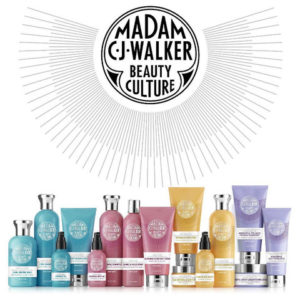
Cosmetic Business
Madam C.J. Walker’s iconic hair brand is coming back to life, thanks to the launch of a new line bearing her name.
Madam C.J. Walker’s Beauty Culture is a four-collection, 25-piece line of products that is exclusively available at Sephora and Sephora.com. Prices range from $24 to $32, an amount on par with the beauty icon’s prestige. According to the Beauty Culture website, the collections are split into four categories meant to maximize moisture for curly and coily hair, tame frizz for wavy and curly tresses, smooth heat-styled manes and nourish strands of all hair types.
Produced by Sundial Brands, the company behind Black hair brands like Shea Moisture, the hair care line primarily targets Black women’s textured hair. Sundial’s chief executive officer, Richelieu Dennis, said the company has grown 50 to 60 percent over the past six or seven years by listening to consumers, according to WWNO.
“There’s a consumer that’s been so underserved and in most cases ignored by the larger, more mainstream brands,” Dennis said to WWNO.

Instyle/@madamcjwalkerbeauty Instagram
A’Lelia Bundles, a historian and biographer, is Walker’s great-great-granddaughter.
She told The Root, “It is a statement to be in a place like Sephora,” adding that the store has “been wonderful about wanting to make sure that the legacy is part of the overall story that is going on.”
In a time where Black women are moving away from chemically straightening their hair with relaxers, there has been an increase in demand for products that work well on coiled manes.
Research from Mintel says that women deciding to go natural and embrace the hair texture they were born with has negatively impacted the sales of relaxers. Sales dropped 18.6 percent from 2013 to 2015. The change also means that by 2020, relaxers are unlikely to be the second-largest segment in the Black hair market. That segment includes shampoos and boxed hair dyes.
The same research supports the addition of Madam C.J. Walker’s Beauty Culture onto Sephora’s shelves. Approximately 51 percent of Black consumers report using styling products, compared to 34 percent of consumers overall.


